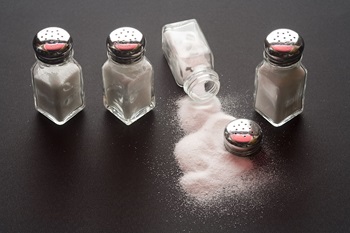By: Melaina Lewis, Communications Specialist, Food Marketing Institute
 I remember hearing dozens of old wives’ tales growing up. Some pertained to superstitions, such as opening an umbrella while still inside would bring 10 years bad luck, or if I spilled salt I would throw a pinch over my left shoulder. Others I remember primarily related to misconceptions about food that were neither scientifically accurate nor rationale, such as eating celery counts as negative calories or drinking coffee would stunt my growth.
I remember hearing dozens of old wives’ tales growing up. Some pertained to superstitions, such as opening an umbrella while still inside would bring 10 years bad luck, or if I spilled salt I would throw a pinch over my left shoulder. Others I remember primarily related to misconceptions about food that were neither scientifically accurate nor rationale, such as eating celery counts as negative calories or drinking coffee would stunt my growth.
The dilemma with popular old wives’ tales is they blur the lines between fact and fiction. While I’m fairly confident that stepping on a crack will not break my mother’s back, misinformation can also be misconstrued as fact if you hear it enough.
I specifically recall being told if I bought refrigerated fresh meat I couldn’t refreeze it due to the risk of bacteria. This, like many other myths about the food retail industry, is inaccurate. According to USDA Food Safety Inspection Service (FSIS), once food is thawed in the refrigerator, it is safe to refreeze without cooking. Misconceptions have the ability to linger for years being repeated and passed onto others.
There’s always a hint of truth to a myth, making it difficult to decipher misconceptions. Dozens of myths exist specifically about supermarkets, which is why we created www.fmi.org/SupermarketMyths. Consumers want information readily available, and they want this information validated through third-party sources. Clarity about the food retail industry will help consumers tell the difference between fact and fiction, which is why we’re challenging supermarket myths that are all too frequently repeated.
Can you tell the difference between fact and fiction when it comes to Supermarket Myths? Test your knowledge now by taking our Supermarket Mythbusters quiz.
Knock on wood or you might jinx yourself!


 Industry Topics address your specific area of expertise with resources, reports, events and more.
Industry Topics address your specific area of expertise with resources, reports, events and more.
 Our Research covers consumer behavior and retail operation benchmarks so you can make informed business decisions.
Our Research covers consumer behavior and retail operation benchmarks so you can make informed business decisions.
 Events and Education including online and in-person help you advance your food retail career.
Events and Education including online and in-person help you advance your food retail career.
 Food Safety training, resources and guidance that help you create a company food safety culture.
Food Safety training, resources and guidance that help you create a company food safety culture.
 Government Affairs work — federal and state — on the latest food industry policy, regulatory and legislative issues.
Government Affairs work — federal and state — on the latest food industry policy, regulatory and legislative issues.
 Get Involved. From industry awards to newsletters and committees, these resources help you take advantage of your membership.
Get Involved. From industry awards to newsletters and committees, these resources help you take advantage of your membership.
 Best practices, guidance documents, infographics, signage and more for the food industry on the COVID-19 pandemic.
Best practices, guidance documents, infographics, signage and more for the food industry on the COVID-19 pandemic.
